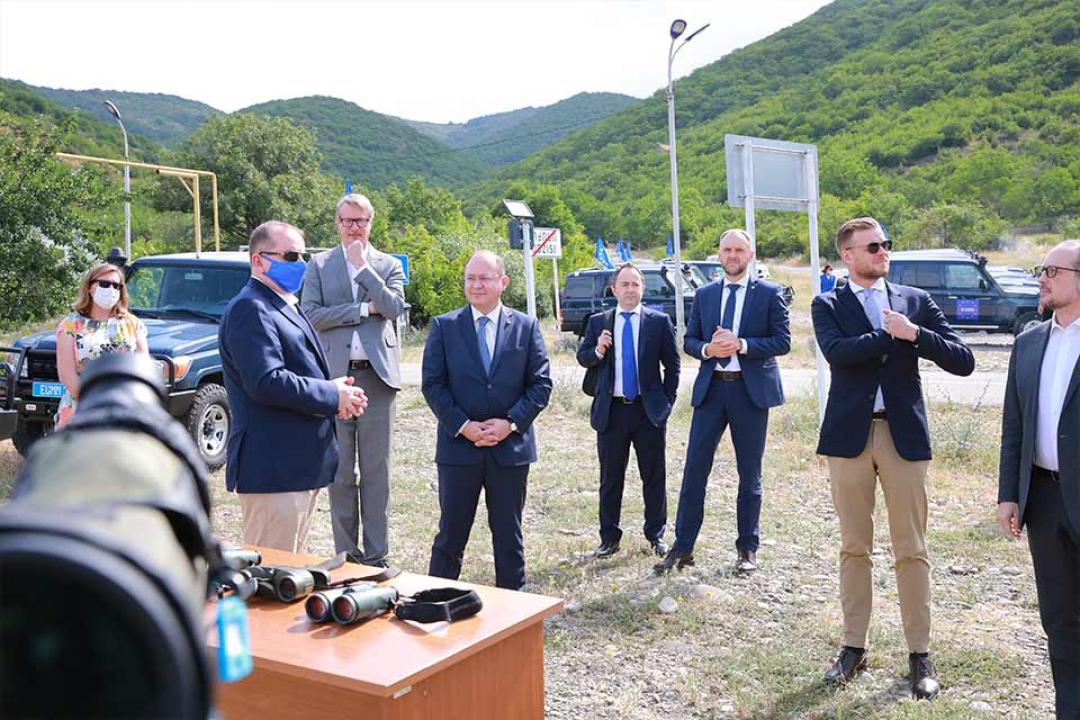
Three EU Foreign Ministers visit Georgia

On 26 June, the foreign ministers of Austria, Romania and Lithuania, Alexander Schallenberg, Bogdan Aurescu and Gabrielius Landsbergis visited Georgia under the mandate of the EU High Representative for Foreign Affairs and Security Policy Joseph Borell.
The three ministers met with the country’s Prime Minister Irakli Garibashvili. According to Garibashvili’s press service, the parties discussed Georgian Foreign Minister’s David Zalkaliani’s recent visit with the two other FMs of the newly established Associated Trio, Ukraine’s Dmytro Kuleba and Moldova’s Aureliu Ciocoi to Brussels. Garibashvili underscored the importance of the Associated Trio’s greater involvement in EU affairs, while reiterating Georgia’s aim to submit a formal application for EU membership in 2024.
The interlocutors also touched upon the situation in the separatist regions of Abkhazia and Tskhinvali (South Ossetia), as well as human rights violations along the administrative boundary line (ABL) between Georgia and the separatist regions. In this context, the parties underlined the importance of more active involvement of the EU in the peace and negotiation processes, including Geneva International Discussions (GID). Garibashvili spoke with EU foreign ministers about the necessary efforts for the immediate release of Georgian citizens Zaza Gakheladze and Irakli Bebua.
The three ministers also visited the ABL with Tskhinvali region near Odzisi village with the EU Monitoring Mission in Georgia (EUMM). The Head of EUMM, Ambassador Marek Szczygieł, shared his insights on the most recent security and humanitarian developments on the ground. He also highlighted the negative impact that “borderisation” features, such as wire fences or observation posts, have on the freedom of movement and other human rights of the conflict-affected communities. The discussions further highlighted that the Covid-19 pandemic amplified residents’ daily challenges.
Afterwards, the three ministers held a press conference summarising their visit to Georgia. Aurescu focused on the Eastern Partnership, stressing the importance of maintaining the inclusiveness of the Partnership, and adding that the EU “should be ready to reward the efforts of our most ambitious and committed partners, such as Georgia, but also Ukraine and Moldova.” “From Romania’s perspective, I will promote the need to develop a security dimension within the Eastern Partnership,” he emphasised. Aurescu also called for the remaining political forces in Georgia to sign the 19 April political agreement, underlining that “an inclusive political environment, and further modernisation, and democratisation are important for Georgia’s European agenda.”
Schallenberg spoke on the topic of the separatist regions, saying that the borderisation activities by Russia were “unacceptable” and that the detention of Georgia’s citizens was illegal and called for their immediate and unconditional release. The Austrian FM also highlighted Georgia’s “instrumental” role in helping broker an agreement between Azerbaijan and Armenia, resulting in the release of fifteen Armenian prisoners of war in exchange for a map of landmines in Agdam district. Landsbergis shared his thoughts on Georgia’s intention to apply for EU membership, saying that Lithuania believes membership should be open for all countries that meet relevant criteria, though underlined that Georgia still must continue its path of reforms.
Prior to their visit to Georgia, the three EU FM’s also visited Armenia and Azerbaijan (Caucasus Watch reported).
See Also


Yerevan Balances Strategic Ties with Both US and Russia, Says Foreign Minister

FM Mirzoyan: Peace Deal with Azerbaijan Is Within Reach

Pashinyan and Erdogan Hold Call, Reaffirm Commitment to Ongoing Dialogue

Ilham Aliyev and Masoud Pezeshkian Discuss Development of Bilateral Relations

